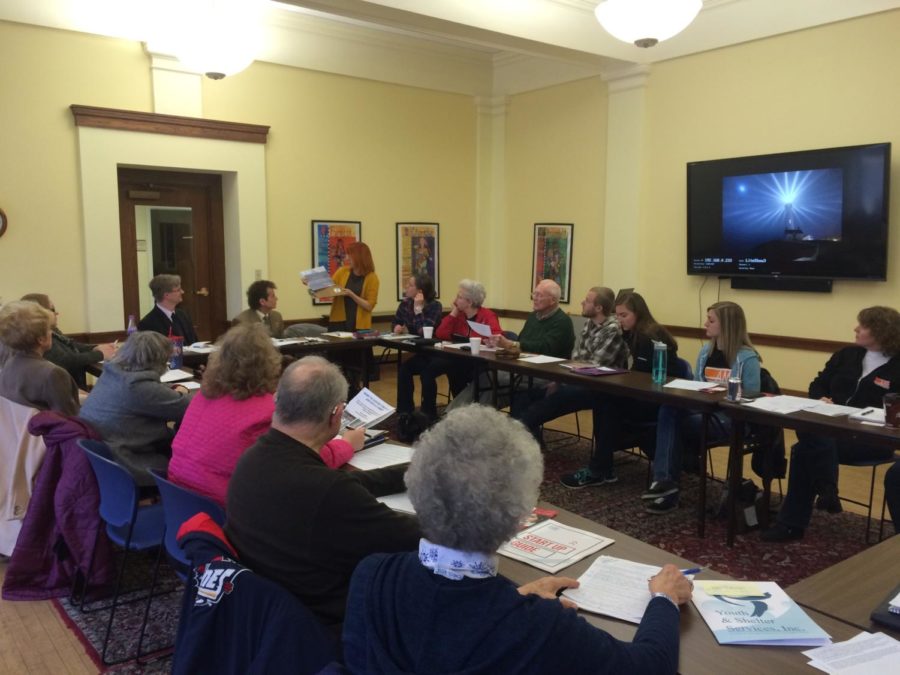Central Iowa group sets goals to prevent human trafficking
The Central Iowa Network Against Human Trafficking met Friday, Jan. 23, at the Jacobson building to discuss how the group is going to address the issue of trafficking minority children in the midwest and create legislation that is human-trafficking sensitive.
January 26, 2015
A central Iowa group dedicated to stopping human trafficking is calling upon the state’s youth to help raise awareness.
Human trafficking is the forcing of people to work in the sex trade or perform any kind of labor by using forms of coercion, abduction, fraud or deception.
Passing new trafficking-sensitive legislation, training law enforcement to detect human trafficking situations and brainstorming ideas on how to raise awareness on trafficked minorities in Iowa were some of the main goals at The Central Iowa Service Network Against Human Trafficking meeting on Jan.23.
Runaway or homeless children are most susceptible to being trafficked, said Teresa Downing-Matibag, co-chairwoman of the network.
“Homeless or runaway children whom are on the street will be approached for trafficking within two days,” she said. “But for the Midwest, it might be closer to 12 or 13 [days]. The longer a youth remains homeless or runaway … the higher the chance they’re going to be brought into the sex trade.”
Downing-Matibag, also an ISU sociology lecturer, said she wants to bring focus to trafficking in minority children, especially those whom identify as lesbian, gay, bisexual, transgender or queer.
“Up to 40 percent of street youth are LGBT youth,” she said.
About 26 percent of the LGBT youth on the streets were kicked out of the house, Downing-Matibag said, and then placed in foster care, where they were again discriminated against and ended up running away.
“Once trafficked, these children face beatings, mutilations, brandings, rapes and a host of other crimes no child should ever live through,” Downing-Matibag read from a US trafficking in persons report.
Representatives from the Iowa Network Against Human trafficking, the Story County Sexual Assault Response Team, Iowa Teens Against Human Trafficking and three Iowa youth and women’s shelters were present.
Some representatives spoke with the Iowa Community College Association to initiate adult community training in order to educate people to recognize the signs of human trafficking in their areas. The curriculum includes how to recognize the signs of a trafficking victim and to learn the risk factors of those who are most likely to be trafficked.
“Look for the absence of normal. If something does not look right, call,” said Terry Hernandez, executive director for the Chrysalis Foundation, a women’s foundation in Des Moines. “What we hear from law enforcement is, ‘we would much rather you be wrong, than have us miss a case.’”
One of the hurdles in training law enforcement isn’t the training itself, Downing-Matibag said, but the number of officers available to train.
In states with similar populations to Iowa, the average ratio of officers to civilians is about 1-to-481. Iowa’s officer to civilian ratio is 1-to-589, according to the latest FBI full time law enforcement employees report in 2011.
Kelly Butcher, president of Iowa State’s chapter of the Network Against Human Trafficking, was there to update the network on her chapter’s progress and goals, which include expanding the club and raising awareness on labor trafficking in addition to the sex trade.
“You hear about sex trafficking and it’s devastating, but you think, OK what can I do? I’m not buying sex. I’m not watching porn, so I’m just going to keep doing my life,” said Butcher, a senior in psychology. “With labor trafficking, we’re all contributing to that with the products that we buy. If we make them more aware of those things, that would be huge.”
Butcher said the issue of human trafficking is important for college and high school aged students to be aware of because they are part of the generation to catch.
“If you get to the just out of college and beyond population, it’s almost too late,” she said. “Whereas if you hit the high schoolers and college kids who are going to be the ones whom then buy or watch porn, and they know about it ahead of time, then they are less likely to do it.”

















